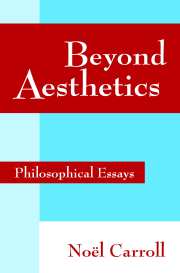Book contents
- Frontmatter
- Contents
- Foreword by Peter Kivy
- Introduction
- PART I BEYOND AESTHETICS
- PART II ART, HISTORY, AND NARRATIVE
- PART III INTERPRETATION AND INTENTION
- PART IV ART, EMOTION, AND MORTALITY
- PART V ALTERNATIVE TOPICS
- On Jokes
- The Paradox of Junk Fiction
- Visual Metaphor
- On Being Moved by Nature: Between Religion and Natural History
- Emotion, Appreciation, and Nature
- Notes
- Index
Emotion, Appreciation, and Nature
Published online by Cambridge University Press: 19 January 2010
- Frontmatter
- Contents
- Foreword by Peter Kivy
- Introduction
- PART I BEYOND AESTHETICS
- PART II ART, HISTORY, AND NARRATIVE
- PART III INTERPRETATION AND INTENTION
- PART IV ART, EMOTION, AND MORTALITY
- PART V ALTERNATIVE TOPICS
- On Jokes
- The Paradox of Junk Fiction
- Visual Metaphor
- On Being Moved by Nature: Between Religion and Natural History
- Emotion, Appreciation, and Nature
- Notes
- Index
Summary
INTRODUCTION
In a previous essay entitled “On Being Moved by Nature: Between Religion and Natural History,” I defended a view of nature appreciation that I called the arousal model. According to the arousal model, one very customary appreciative response to nature is a matter of reacting to it with the appropriate emotions – for example, gazing over a broad expanse of open prairie and becoming possessed by a feeling of serenity. An afternoon drive in the country is often undertaken in anticipation of such experiences. And, indeed, people are frequently willing to travel rather far afield to savor emotionally compelling natural vistas like the Grand Canyon.
In characterizing the arousal model of our response to nature, I did not think that I had discovered some heretofore unrecognized form of nature appreciation. Rather, I took myself to be reporting a common form of intercourse with nature. My point in doing so, however, was motivated theoretically. I intended the arousal model to stand in contrast to the formidable account of nature appreciation that has been developed by Allen Carlson.
Carlson's position – which may be called “the natural environmental model” – maintains that the appropriate aesthetic appreciation of nature depends upon knowledge of nature of the sort supplied by natural history and science, or by their commonsense or folk predecessors. Nature appreciation is a matter of understanding the ecological and evolutionary significance of natural phenomena.
- Type
- Chapter
- Information
- Beyond AestheticsPhilosophical Essays, pp. 384 - 394Publisher: Cambridge University PressPrint publication year: 2001



